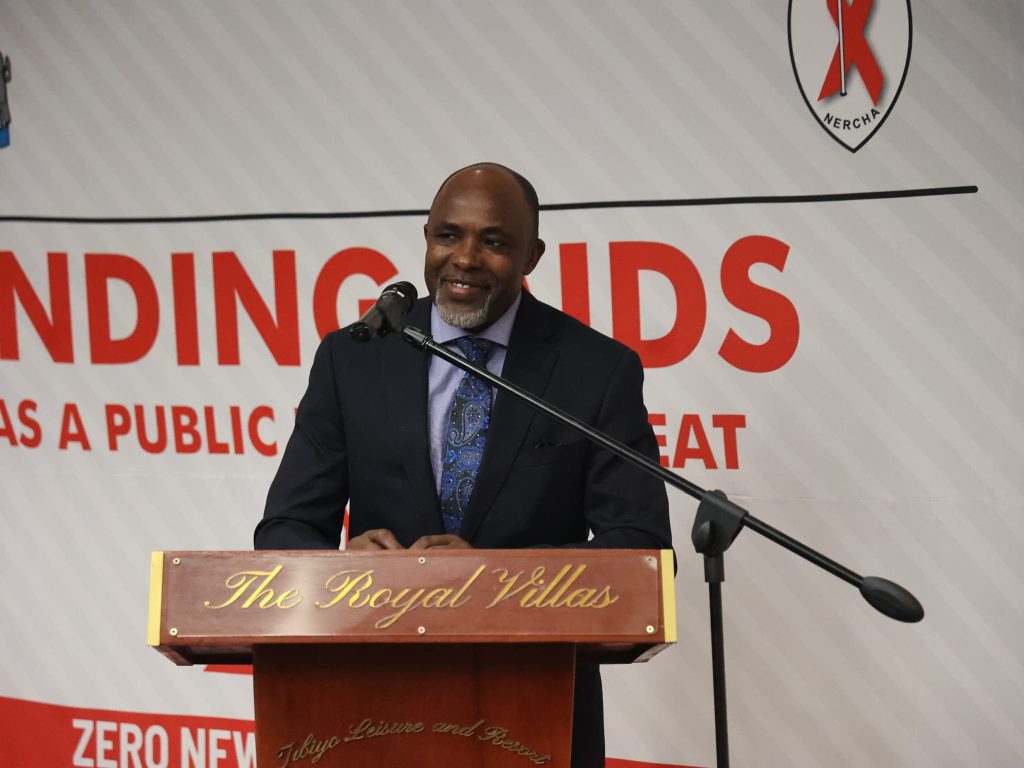By Ncaba Ntshakala
The United Nations Resident Coordinator, George Wachira, has praised His Majesty King Mswati III for Eswatini’s vast contribution of E110 million to the Global Fund.
The King made the generous pledge of US$6 million at the 7th Replenishment Summit in France in 2022, a move that Wachira has hailed as a powerful example of the Kingdom’s dedication to global health solidarity.
Wachira made the commendation during the launch of the National Multisectoral HIV and AIDS Strategic Framework (NSF) 2024-2028 held at the Royal Villas.
Wachira made acknowledgements of Eswatini’s impressive achievements in the global fight against AIDS.
He emphasized the significance of the Kingdom’s success in reaching global targets ahead of the 2025 deadline, expressing the effectiveness of the country’s HIV programs.

“Eswatini has achieved in relation to the global target of ending AIDS as a public health threat, and it would be remiss of me not to applaud the efforts of His Majesty’s Government, all emaSwati, development partners, and people living with HIV, in the fight against HIV and AIDS,” Wachira said.
Again, he highlighted the deep and enduring partnerships that have been critical to Eswatini’s success.
The Global Fund, which has invested over E4.9 billion (US$265 million) in the country, has been a cornerstone of the response to HIV, TB, and Malaria.
ALSO READ: … E824 million boost for HIV, TB, Malaria in Eswatini over two years
Other key partners, including PEPFAR, the European Union, the United Nations, and numerous health-focused NGOs, have also played vital roles in strengthening Eswatini’s health systems and improving health outcomes for all emaSwati.
According to Wachira, the success Eswatini has enjoyed is a story of strong leadership meeting strong partnerships, with each partner contributing significantly to the collective fight against HIV/AIDS.
However, Wachira was clear that despite these successes, the fight was far from over. He cautioned against complacency, urging continued vigilance in the fight against HIV/AIDS.
He said the recently published 2024 Global AIDS Update report, titled The Urgency of Now: AIDS at a Crossroads served as a reminder that global progress in reducing new HIV infections and AIDS-related deaths has stalled.
The report pointed to several critical challenges, including stagnation in global progress, increasing inequities in HIV/AIDS outcomes across different regions and populations, and the exacerbating effects of the Covid-19 pandemic on existing challenges.
In light of these challenges, the Resident Coordinator outlined several key recommendations for Eswatini as it moves forward with the NSF 2024-2028.
He stressed the importance of prioritizing key populations who are disproportionately affected by HIV, such as sex workers, people who inject drugs, and LGBTQ+ individuals.
These groups, he noted, continue to face higher rates of HIV and reduced access to essential services due to stigma and discrimination.
Strengthening health systems to ensure they are resilient and capable of maintaining essential HIV/AIDS services, even during crises like pandemics, was another critical recommendation.
Wachira also stressed the need for increased global and national funding, as well as cooperation and partnerships to support HIV/AIDS programs.
Moreover, Wachira emphasized that the success of the National HIV Strategic Framework 2024-2028 would depend not only on health interventions but also on addressing the social determinants of health that drive the epidemic.
ALSO READ: PM challenges Lobamba to combat HIV/AIDS through social behavioural change
He pointed to poverty, gender inequality, violence against women and girls, and stigma as powerful barriers that hinder access to HIV services and exacerbate vulnerability to infection.
He called for evidence-based approaches that address these underlying factors, such as economic empowerment initiatives, gender-sensitive programming, and anti-stigma campaigns, as crucial elements of creating an enabling environment where all individuals can access the care they need.
He also reminded the audience of the campaigns launched in the past that must remain active, including efforts to keep girls in school, eliminate child and early pregnancies, and address cultural norms that hinder the fight against HIV.
He particularly emphasized the need to continue educating and discouraging harmful practices, such as older men engaging in relationships with young girls, a practice he previously referred to as “OMG! Old Men Having sex with Girls.”
Furthermore, Wachira expressed the United Nations’ enduring commitment to supporting Eswatini in its fight against HIV/AIDS.
He called on all stakeholders to remain committed to the principles of inclusivity, equity, and sustainability as they embark on the implementation of the NSF 2024-2028.
With a unified effort, he asserted, Eswatini can build a future where HIV is no longer a threat to the health and well-being of its people.
